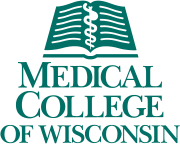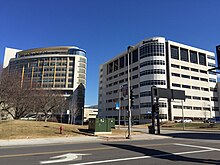Medical College of Wisconsin
 | |
| Type | Private medical school |
|---|---|
| Established | 1893 |
| Endowment | $1.23 billion (2020)[1] |
| President | John R. Raymond |
| Postgraduates | 1,217[2] |
| Location | , , United States 43°2′41″N 88°1′21″W / 43.04472°N 88.02250°WCoordinates: 43°2′41″N 88°1′21″W / 43.04472°N 88.02250°W |
| Campus | Suburban |
| Website | www |
The Medical College of Wisconsin (MCW) is a private medical school and graduate school of sciences headquartered in Wauwatosa, Wisconsin,[3][4] just outside Milwaukee. Formerly affiliated with Marquette University, it has operated as an independent institution since 1967.[2] It has two additional campuses, one in Green Bay and one in Wausau.
MCW is accredited by the Higher Learning Commission of the North Central Association of Colleges and Schools (HLC) and by the Liaison Committee on Medical Education (LCME).[2] It is the only private medical school in Wisconsin, and one of only two medical schools in Wisconsin, along with the University of Wisconsin School of Medicine and Public Health in Madison.[5]
The MCW houses the Center for Infectious Disease Research (CIDR) which has a BSL3 laboratory.[6]
History[]
The Medical College began to be realized with the founding of the Wisconsin College of Physicians and Surgeons in 1893 and of Milwaukee Medical College in 1894.[2][7] In 1906, Marquette College (now Marquette University), merged with the nearby Milwaukee Medical College. On May 14, 1907, Milwaukee Medical College became the Medical Department of the newly chartered Marquette University.[8]
In 1913, in response to the standards introduced by the Flexner Report, Marquette University purchased the Wisconsin College of Physicians and Surgeons, thereby creating a separate institution, the Marquette University School of Medicine.[5]
During World War II, the school developed close ties with the local Veterans Health Administration hospital in Milwaukee.
In the 1950s, local philanthropist Kurtis Froedtert, bequeathed much of his estate to the establishment of a teaching hospital, which became today's Froedtert Memorial Lutheran Hospital.[5][9][10] Opened 41 years ago in 1980,[11] Froedtert Hospital is adjacent to MCW and is one of the three major affiliated health care centers where MCW students, residents and physicians practice.[2]
On September 30, 1967, Marquette University terminated its relationship with the medical school because of financial difficulties,[12][13] and the school continued as a private school.[14][15][16] It changed its name to the Medical College of Wisconsin in 1970.[17]
MCW has more than 16,000 alumni, all of whom are represented by the Medical College of Wisconsin-Marquette Medical Alumni Association.[5]
Academics[]
There are more than 1,200 students enrolled in education programs at the Medical College of Wisconsin. This consists of about 817 medical students and 400 graduate students. An additional 670 physicians in residency and 180 physicians in fellowship training work with the College's affiliated hospitals throughout the state. About 160 scientists conduct postdoctoral research with MCW.[2]

MCW opened a new campus in Green Bay in July 2015 that provides a focused, three-year curriculum for students seeking careers in primary care, general surgery, or psychiatry. The college subsequently opened the Central Wisconsin campus, located in Wausau, in July 2016.[2]

MCW grants M.D., Ph.D, M.S., M.P.H., M.A., and combination degrees. Through the Medical Scientist Training Program (MSTP), students may enter a combined M.D./Ph.D. degree program.[18]
Joint degree programs with other institutions are offered in: bioinformatics (MS) and healthcare technologies management (MS) with Marquette University, and medical informatics (MS) with the Milwaukee School of Engineering. In addition, Graduate Certificate programs are offered in Clinical Bioethics, Public Health, Research Ethics, and a joint Bioethics Certificate with the American Medical Association.[18] Residency training is offered in nearly 30 medical specialties and subspecialties.[19]
Admissions[]
The average MCAT scores and undergraduate GPA for the entering class of 2019 were 510 and 3.76, respectively.[20] About 53% of the incoming class was male. The highest number of incoming students completed their undergraduate degrees at the University of Wisconsin–Madison, Brigham Young University, University of Illinois at Urbana–Champaign, Marquette University, UCLA, and the University of Minnesota.[20]
Research[]
As a research center, the Medical College of Wisconsin received more than $154 million in external support for research, teaching, training and related purposes in fiscal year (FY) 2013–2014. MCW received about $79.5 million in NIH funding and ranked 46th among 137 medical schools in the country for NIH research funding. Its faculty conducted more than 2,500 research studies, including clinical trials, in the same fiscal year. Overall, it is the largest research center in the Milwaukee metropolitan area and the second-largest in Wisconsin.[2]
Notable alumni[]
- Larry Bucshon – U.S. Representative from Indiana
- Sarah K. England – physiologist and biophysicist
- Olawale Sulaiman – neurosurgeon and academic
- Richard D. Weisel – cardiothoracic surgeon, professor of surgery at University of Toronto, editor-in-chief of the Journal of Thoracic and Cardiovascular Surgery
- Don J. Wright - Acting United States Secretary of Health and Human Services and United States Ambassador to Tanzania
- Jeffery D. Molkentin - molecular biologist
- - clinical psychiatrist, member of "America's Frontline Doctors", promoter of Ivermectin as a treatment for COVID-19 [21]
References[]
- ^ As of June 30, 2020. U.S. and Canadian Institutions Listed by Fiscal Year 2020 Endowment Market Value and Change in Endowment Market Value from FY19 to FY20 (Report). National Association of College and University Business Officers and TIAA. February 19, 2021. Retrieved February 19, 2021.
- ^ Jump up to: a b c d e f g h "Facts about MCW". mcw.edu. Medical College of Wisconsin. Archived from the original (PDF) on 17 April 2015. Retrieved 30 March 2015.
- ^ Jump up to: a b "Business Neighborhoods". City of Wauwatosa. City of Wauwatosa. Retrieved 28 May 2021.
- ^ Jump up to: a b Google (28 May 2021). "Wauwatosa, WI" (Map). Google Maps. Google. Retrieved 28 May 2021.
- ^ Jump up to: a b c d "History of MCW". mcw.edu. Medical College of Wisconsin. Archived from the original on June 2, 2012. Retrieved March 3, 2013.
- ^ "Center for Infectious Disease Research (CIDR) - Facilities - BSL3 and ABSL3 Facilities". Medical College of Wisconsin. Retrieved 4 February 2021.
- ^ An Anchor For The Future: A History of the Medical College of Wisconsin. 1991, The Medical College of Wisconsin., pp. 1,7.
- ^ An Anchor For The Future: A History of the Medical College of Wisconsin., p.8.
- ^ "Lutheran medical school is proposed". Milwaukee Journal. January 10, 1962. p. 1, part 2.
- ^ Spaulding, James (September 4, 1968). "Froedtert Hospital to be part of center". Milwaukee Journal. p. 1, part 1.
- ^ Patrinos, Dan (May 13, 1980). "Froedtert Hospital opening set". Milwaukee Sentinel. p. 5.
- ^ "UWM keeps medical school goal". Milwaukee Sentinel. October 2, 1967. p. 5, part 1.
- ^ "Knowles urges aid for medical school". Milwaukee Journal. February 13, 1968. p. 1, part 1.
- ^ "Marquette medical school insists on private control". Milwaukee Sentinel. June 26, 1968. p. 8. part 1.
- ^ Shively, Neil H. (November 28, 1968). "MU school fund bid gets powerful ally". Milwaukee Sentinel. p. 1, part 1.
- ^ "Medical school here in danger of closing". Milwaukee Journal. July 14, 1969. p. 1, part 1.
- ^ Spaulding, James (September 22, 1970). "School of Medicine drops 'Marquette'". Milwaukee Journal. p. 1, part 1.
- ^ Jump up to: a b "Programs & Degrees". mcw.edu. Medical College of Wisconsin. Retrieved 3 March 2013.
- ^ "Residency Programs". mcw.edu. Medical College of Wisconsin. Retrieved 3 March 2013.
- ^ Jump up to: a b "Medical School Admissions Requirements". American Association of Medical Colleges. Retrieved 7 March 2021.
- ^ "A doctor who advised Florida Gov. DeSantis on COVID-19 promoted horse dewormer ivermectin to treat the disease". Yahoo News. 2021-08-28. Retrieved 2021-08-28.
External links[]
- Medical College of Wisconsin
- Educational institutions established in 1893
- Former Catholic universities and colleges in the United States
- Marquette University
- Medical schools in Wisconsin
- Schools of public health in the United States
- 1893 establishments in Wisconsin
- Private universities and colleges in Wisconsin

